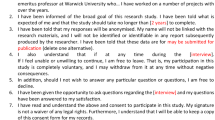Abstract
The fast growing interest in the work of university ethics review boards is evident in the proliferation of research and literature in the area. This article focuses on a Research Ethics Board (REB) in the Canadian context. In-depth, open-ended interviews with REB members and findings from a qualitative study designed to examine the ethics review of school-based research are used to illustrate points raised in the paper. The author’s experiences as academic researcher, advisor to student researchers and a 3-year term as an REB member inform the discussion. Macro issues related to the general workings of the board (e.g., maintaining appropriate membership) and micro issues connected to individual REB members’ experiences of reviewing research applications are examined. The author’s goal is to contribute to a fastgrowing conversation related to the issues that influence university ethics review while drawing attention to the contribution that faculty members’ understandings of their work as REB members can make to that conversation.
Similar content being viewed by others
References
Anderson, P. V. (1996). Ethics, Institutional Review Boards, and the involvement of human participants in composition research. In P. Mortensen, & G. Kirsch (Eds.), Ethics and representation in qualitative studies of literacy (pp. 260–285). Urbana, IL: National Council of Teachers of English.
Canadian Institutes of Health Research, Natural Sciences and Engineering Research Council of Canada, Social Sciences and Humanities Research Council of Canada. (1998 with 2000, 2002 and 2005 amendments). Tri-Council policy statement: Ethical conduct for research involving humans. Retrieved April 15, 2008, from http://pre.ethics.gc.ca/english/policystatement/policystatement.cfm.
Fitzgerald, M. H. (2005). Punctuated equilibrium, moral panics, and the ethics review process. Journal of Academic Ethics, 2, 315–338.
Foucault, M. (1980). Prison talk. In C. Gordon (Ed.), Michel Foucault: Power/Knowledge, selected interviews, 1972–1977 (pp. 37–54). Brighton, England: Harvester Press.
Grayson, J. P., & Myles, R. (2005). How research ethics boards are undermining survey research on Canadian university students. Journal of Academic Ethics, 2, 293–314.
Guillemin, M., & Gillam, L. (2004). Ethics, reflexivity, and “ethically important moments” in research. Qualitative Inquiry, 10, 261–280.
Haggerty, K. D. (2004). Ethics creep: Governing social sciences research in the name of ethics. Qualitative Sociology, 27(4), 319–414.
Halse, C., & Honey, A. (2005). Unravelling ethics: Illuminating the moral dilemmas of research ethics. Signs: Journal of Women in Culture and Society: Special Issue on Dilemmas in Feminist Social Research, 30(4), 1–34.
Lincoln, Y. S., & Guba, E. G. (1985). Naturalistic inquiry. Newbury Park, CA: Sage.
Lincoln, Y. S., & Tierney, W. G. (2004). Qualitative research and institutional review boards. Qualitative Inquiry, 10(2), 219–234.
Pritchard, I. (2002). Travelers and trolls: Practitioner research and institutional review boards. Educational Researcher, 31(3), 3–13.
Sieber, J. E. (1992). Planning ethically responsible research: A guide for students and internal review boards. Newbury Park, CA: Sage.
Smith, D. (1990). The conceptual practices of power: A feminist sociology of knowledge. Boston: Northeastern University Press.
Social Sciences and Humanities Research Ethics Special Working Committee (2004). Giving voice to the spectrum: Report of the Social Sciences and Humanities Working Committee to the Interagency Advisory Panel on Research Ethics. Ottawa, Ontario, Canada: Interagency Panel on Research Ethics.
Tilley, S. A., & Ratkovic, S. (2006, May). District school boards and ethics review of school-based research: An Ontario perspective. Paper presented at the annual meeting of the Canadian Society for the Study of Education, Toronto, Ontario, Canada.
Tilley, S. A., Killins, J., & Van Oosten, D. (2005). Connections and tensions between university and school districts: Research review boards and school-based research. Alberta Journal of Education, 51(3), 1–16.
van den Hoonaard, W. C. (2002). Walking the tightrope: Ethical issues for qualitative researchers. Toronto, Ontario, Canada: University of Toronto Press.
Zeni, J. (2001). A guide to ethical decision making for insider research. In J. Zeni (Ed.), Ethical –issues in practitioner research (pp. 153–165). New York: Teachers College Press.
Acknowledgements
The author thanks the REB members who were willing to participate in the interviews. This paper is built on work to which Dr. Janet Killins and Deborah van Oosten contributed in the early stages. Kelly Powick-Kumar contributed through her work as a Research Assistant for the larger project. Thanks also go to Naomi Norquay who provided a special space to write at the Roundhouse.
The Social Sciences and Humanities Council (SSHRC) has funded the research program from which this paper was developed.
Author information
Authors and Affiliations
Corresponding author
Rights and permissions
About this article
Cite this article
Tilley, S.A. A Troubled Dance: Doing the Work of Research Ethics Review. J Acad Ethics 6, 91–104 (2008). https://doi.org/10.1007/s10805-008-9058-8
Received:
Accepted:
Published:
Issue Date:
DOI: https://doi.org/10.1007/s10805-008-9058-8




